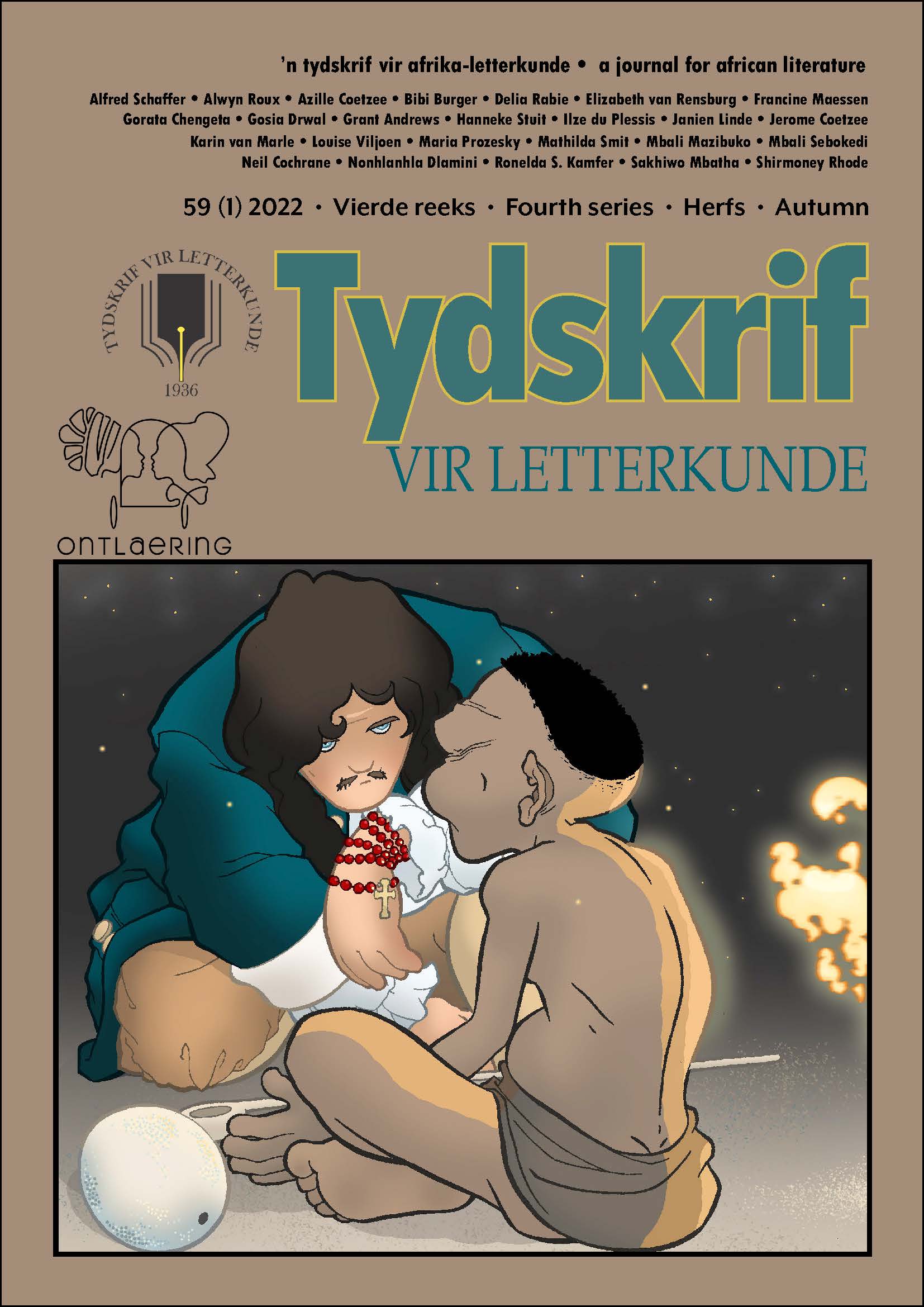African speculative fiction as Indigenous remembering: Contrasting stories by Jonathan Dotse and Masima Musodza
English
DOI:
https://doi.org/10.17159/tl.v59i1.12727Keywords:
African speculative fiction, Afrofuturism, hunhu, relational personhood, epistemic decolonisationAbstract
How to understand what uniquely African contribution speculative fiction created by African authors makes is a vexed question. Drawing on concepts of the geopolitics of knowledge and locus of enunciation, from the South American tradition of decolonial theory, I argue that the term “Indigenous” must be retained to specify works that speak from epistemic locations within Indigenous African cultures. Such fiction does important remembering work by recovering, renewing, and extending Indigenous knowledge traditions and so claiming the right to imagine futures in Indigenous terms. This remembering is obscured if such fiction is examined in terms such as Afrofuturism, which primarily focuses on race, or Africanfuturism, which focuses on geographical location. Indigenous remembering works from a specific Indigenous locus of enunciation and uses this episteme to explain the present and imagine the future. Such remembering must be distinguished from works that reduce Indigenous knowledge and knowers to tokens of their culture, as the “Other” to Eurocentric knowledge and its claim of universality. I illustrate this distinction by discussing two stories, “The writing in the stars” by Jonathan Dotse and “Herbert wants to return home” by Masima Musodza, showing how Musodza’s story is told from within a specific Indigenous framework, the Shona conception of personhood known in Shona as hunhu, whereas Dotse’s tale speaks about Malian astrophysics but from outside it. It is this distinction, a vital colonial difference, that the term Indigenous African speculative fiction aims to capture.
Downloads
Metrics
References
Adejunmobi, Moradewun. “Introduction; African Science Fiction.” Cambridge Journal of Postcolonial Literary Inquiry vol. 3, special issue 3, 2016, pp. 265–72. DOI: https://doi.org/10.1017/pli.2016.28.
Botha, Louis, Dominic Griffiths & Maria Prozesky. “Epistemological Decolonization through a Relational Knowledge-Making Model.” Africa Today vol. 67, no. 4, 2021, pp. 51–72.
Bould, Mark. “Africa Sf: Introduction.” Paradoxa no. 25, 2013, pp. 7–15.
Coetzee, Azille Alta. African Feminism as Decolonising Force: A Philosophical Exploration of the Work of Oyèrónké Oyĕwùmí. Diss. Stellenbosch U, 2017. http://hdl.handle.net/10019.1/102695.
Cornum, Lou, & Maureen Moynagh. “Introduction: Decolonial (Re)Visions of Science Fiction, Fantasy, and Horror.” Canadian Literature no. 240, 2020, pp. 8–18. DOI: https://doi.org/10.14288/cl.vi240.193606.
Dillon, Grace L., ed. Walking the Clouds: An Anthology of Indigenous Science Fiction. U of Arizona P, 2012.
Dotse, Jonathan. “The Writing in the Stars.” The Manchester Review vol. 18, 2017. http://www.themanchesterreview.co.uk/?p=7672.
Grosfoguel, Ramon. “Decolonizing Post-Colonial Studies and Paradigms of Political-Economy: Transmodernity, Decolonial Thinking, and Global Coloniality.” Transmodernity vol. 1, no. 1, 2011, pp. 1–38. DOI: https://doi.org/10.5070/T411000004.
Hanchey, Jenna N. “‘The Self Is Embodied’: Reading Queer and Trans Africanfuturism in The Wormwood Trilogy.” Journal of International and Intercultural Communication vol. 14, no. 4, 2021, pp. 1–15. DOI: https://doi.org/10.1080/17513057.2021.1931707.
Hapanyengwi-Chemhuru, Oswald & Ngoni Makuvaza. “Hunhu: In Search of an Indigenous Philosophy for the Zimbabwean Education System.” Journal of Indigenous Social Development vol. 3, no. 1, 2014, pp. 1–15. https://journalhosting.ucalgary.ca/index.php/jisd/article/view/63054.
Kahiu, Wanuri. “Afrofuturism and the African: Wanuri Kahiu at TEDxNairobi.” YouTube. 14 Sep. 2012. https://www.youtube.com/watch?v=PvxOLVaV2YY.
Kaphagawani, Didier Njirayamanda. “African Conceptions of a Person: A Critical Survey.” A Companion to African Philosophy, edited by Kwasi Wiredu. Blackwell, 2004, pp. 332–42.
Masolo, D. A. “Western and African Communitarianism: A Comparison.” A Companion to African Philosophy, edited by Kwasi Wiredu. Blackwell, 2004, pp. 483–98.
Mbembe, Achilles. “Decolonizing knowledge and the question of the archive.” WISER: Wits Institute for Social and Economic Research. 13 Mar. 2016. https://wiser.wits.ac.za/content/achille-mbembe-decolonizing-knowledge-and-question-archive-12388.
Mbiti, John S. African Religions and Philosophy. Heinemann, 1969.
Menkiti, Ifeanyi A. “On the Normative Conception of a Person.” A Companion to African Philosophy, edited by Kwasi Wiredu. Blackwell, 2004, pp. 324–31.
Mignolo, Walter D. “Delinking: The Rhetoric of Modernity, the Logic of Coloniality and the Grammar of de-Coloniality.” Cultural Studies vol. 21, no. 2–3, 2007, pp. 449–514. DOI: https://doi.org/10.1080/09502380601162647.
Mignolo, Walter D. “Epistemic Disobedience, Independent Thought and Decolonial Freedom.” Theory, Culture & Society vol. 26, no. 7–8, 2009, pp. 159–81. DOI: https://doi.org/10.1177/0263276409349275.
Mignolo, Walter D. “The Geopolitics of Knowledge and the Colonial Difference.” The South Atlantic Quarterly vol. 101, no. 1, 2002, pp. 57–96. DOI: https://doi.org/10.1215/00382876-101-1-57.
Murungi, John. “The Questions of African Jurisprudence: Some Hermeneutic Reflections.” A Companion to African Philosophy, edited by Kwasi Wiredu. Blackwell, 2004, pp. 519–26.
Musodza, Masima. “Herbert Wants to Return Home.” The Manchester Review vol. 18, 2017. http://www.themanchesterreview.co.uk/?p=8121.
Nakata, Martin Nicholas, et al. “Decolonial Goals and Pedagogies for Indigenous Studies.” Decolonization: Indigeneity, Education & Society vol. 1, no. 1, 2012, pp. 120–40. https://jps.library.utoronto.ca/index.php/des/article/view/18628.
Okorafor, Nnedi. “Africanfuturism defined.” Nnedi’s Wahala Zone Blog: The Adventures of Writer Nnedi Okorafor and Her Daughter Anyaugo Okorafor. 19 Oct. 2019. https://nnedi.blogspot.com/2019/10/africanfuturism-defined.html.
Oyĕwùmí, Oyèrónkẹ́. The Invention of Women: Making an African Sense of Western Gender Discourses. U of Minnesota P, 1997.
Samatar, Sofia. “Toward a Planetary History of Afrofuturism.” Research in African Literatures vol. 48, no. 4, 2017, p. 175. DOI: https://doi.org/10.2979/reseafrilite.48.4.12.
Smith, Linda Tuhiwai. Decolonizing Methodologies: Research and Indigenous Peoples. Zed, U of Otago P, St. Martin’s, 1999.
Tuck, Eve & K. Wayne Yang. “Decolonization Is Not a Metaphor.” Decolonization: Indigeneity, Education & Society vol. 1, no. 1, 2012, pp. 1–40. DOI: https://doi.org/10.25058/20112742.n38.04.
Van Beek, Walter E. A. “Haunting Griaule: Experiences from the Restudy of the Dogon.” History in Africa vol. 31, 2004, pp. 43–63. https://www.jstor.org/stable/4128518.
Vizenor, Gerald Robert. Fugitive Poses: Native American Indian Scenes of Absence and Presence. U of Nebraska P, 1998.
Wiredu, Kwasi. “Toward Decolonizing African Philosophy and Religion.” African Studies Quarterly vol. 1, no. 4, 1998, pp. 17–46.
Womac, Ytasha L. Afrofuturism: The World of Black Sci-fi and Fantasy Culture. Lawrence Hill, 2013.
Published
How to Cite
Issue
Section
License
Copyright (c) 2022 Tydskrif vir Letterkunde

This work is licensed under a Creative Commons Attribution-ShareAlike 4.0 International License.


 https://orcid.org/0000-0001-6465-6584
https://orcid.org/0000-0001-6465-6584


.png)